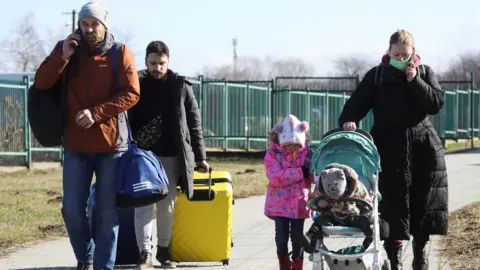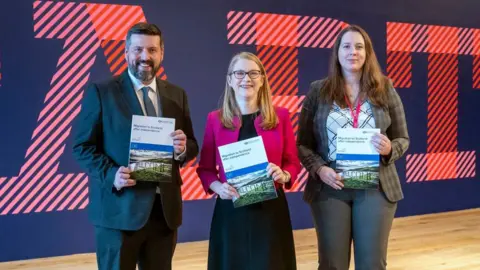Scottish independence: Asylum system would be overhauled
 Reuters
ReutersThe Scottish government would overhaul the migration and asylum system in an independent Scotland, saying it would make it easier for people to live, work, study and invest in Scotland.
It sets out proposals in its "Migration to Scotland after independence" paper.
The new system would be "specifically tailored to Scotland's needs", Social Justice Secretary Shirley-Anne Somerville said.
The government said its plans would help boost Scotland's economy.
Prime Minister Rishi Sunak has said the question of Scottish independence was settled in the 2014 referendum.
The sixth paper in the Building a New Scotland series, includes proposals for a new visa system and plans to support population growth in rural and island areas, and in key economic sectors such as tourism and hospitality.
Asylum and migration policy would be restructured to move away from the current UK system, with people seeking asylum given the right to work and access employability services, to help integration and address key labour market shortages.
The paper said an independent Scotland would "establish a humane approach to supporting refugees and people fleeing conflict and persecution, who deserve our compassion and aid".
It added that dignity, fairness and respect would be "at the heart of all aspects of immigration policy".
The paper also includes details of a simplified immigration system with lower fees and new public agencies to manage how migration and citizenship systems would operate, in line with the Scottish government's commitment to rejoin the EU as an independent nation.
It said: "As we rejoin the EU, we would again welcome fellow EU citizens through free movement - just as Scottish citizens would again be EU citizens, and able to enjoy free movement in Europe."
 PA Media
PA MediaLaunching the paper at the V&A in Dundee, Ms Somerville said: "Our future success as a country is dependent above all else on the people who live here, and we value all those who have chosen to settle in Scotland for their invaluable contribution to our society and economy.
"This paper published today sets out how, with independence, we could help ensure that success with a migration system specifically tailored to Scotland's needs, to make it easier for more people to settle and integrate here."
She said Scotland's population was set to fall, unlike other UK nations, under current constitutional arrangements.
"This means fewer people working, paying taxes and contributing to public services like the NHS," she said. "Yet Scotland is subject to the UK government's hostile approach to immigration which is damaging our economy.
"Control of our own migration policy would enable us to replace that approach with a system that has dignity, fairness and respect at its core, recognising, above all, that this is about individuals and their families.
"It is these values that will determine an independent Scotland's approach to migration and asylum policy - to benefit our country and the people who would call it home."
Pamela Nash, chief executive of Scotland in Union, said: "If the SNP was being honest with voters, it would address the challenges of a border between us and the rest of the UK, and the lengthy, difficult and expensive process to join the EU."
Scottish independence strategy
In October, First Minister Humza Yousaf announced his new strategy to gain Scottish independence.
He stepped back from the idea put forward by his predecessor, Nicola Sturgeon, of treating the next general election as a referendum in all but name.
 Getty Images
Getty ImagesInstead, the party will demand a referendum if it wins a majority of Scottish constituencies at Westminster - 29 seats.
The SNP won 48 seats at the last election in 2019, but recent polling has suggested the party has lost much of its once-huge lead over Labour.
The new strategy was voted through overwhelmingly at the party's annual conference in Aberdeen.
However, it is unlikely that the UK government will agree to another referendum.
An amendment passed by delegates stated that if the UK government continued to refuse to accept demands for a second referendum, or to transfer powers to Holyrood to be able to stage one, the SNP should consider using the 2026 Scottish Parliament election as a de facto vote.
Both Labour and the Conservatives have previously made it clear that they would block a second referendum on independence.
